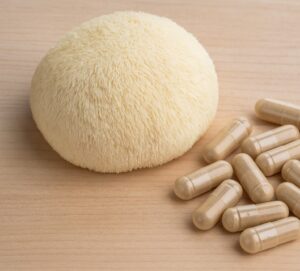
B25012 I By M. Faisal Hossain, BPharm, MPharm, PhD
In recent years, Lion’s Mane mushroom (Hericium erinaceus) has gained widespread attention for its ability to enhance memory, mood, and mental clarity. More importantly, emerging research suggests it could help protect against neurodegenerative diseases like Alzheimer’s.
But does the science back the claims?
Let’s explore what human clinical trials, molecular research, and neuroscience say about this remarkable fungus.
What Is Lion’s Mane?
Lion’s Mane is a medicinal and culinary mushroom known for its toothy, icicle-like appearance and brain-enhancing potential. It contains several powerful compounds:
- Erinacines (mycelium)
- Hericenones (fruiting body)
- Polysaccharides
These compounds are linked to nerve growth, antioxidant activity, and inflammation control.
Clinical Evidence: How Lion’s Mane Supports Brain Health
✅ 1. Improves Processing Speed and Brain-Derived Neurotrophic Factor (BDNF)
A 2024 study in the Journal of Functional Foods showed that 8 weeks of Lion’s Mane supplementation:
- Enhanced cognitive speed
- Increased BDNF (brain growth hormone)
- Improved gut microbiota linked to mood and cognition
✅ 2. Supports Alzheimer’s Patients with Cognitive & Visual Gains
In a 49-week randomized controlled trial (RCT), Alzheimer’s patients taking erinacine A–enriched mycelia showed:
- ↑ Brain white matter integrity (confirmed by MRI imaging)
- Better contrast sensitivity
✅ 3. Boosts Brain Speed in Healthy Adults (in Just 60 Minutes)
A 2023 Nutrients study showed that healthy young adults had faster reaction time (Stroop task) just 1 hour after taking Lion’s Mane.
-
After 28 days, participants reported reduced subjective stress.
✅ 4. Prevents Cognitive Decline in Older Adults
In a 2019 Japanese clinical trial, older adults taking fruiting body Lion’s Mane extract for 12 weeks:
- Improved MMSE scores
- Showed better memory and verbal learning
- Prevented age-related decline
Other Unique Benefits of Lion’s Mane
- Stress and Mood Regulation (↑ NPY, ↓ subjective stress)
- Vision Support (↑ contrast sensitivity in the elderly)
- Neuroprotection (anti-apoptotic effects)
⚠️ Is Lion’s Mane Safe?
Across all reviewed studies:
- Doses ranged from 1.8 g/day to 3 x 350 mg capsules/day
- Most participants tolerated it well
- Minor side effects: abdominal discomfort, rash, in a few long-term users
Who Can Benefit?
- Older adults with memory loss or MCI
- Alzheimer’s patients in the early stages
- Individuals with brain fog or stress
Important note: Standardized erinacine A–enriched extracts showed the most benefit in clinical studies.
Final Thoughts
Lion’s Mane is more than a supplement trend — it’s a science-backed natural nootropic and neuroprotective agent. Whether you’re seeking mental clarity or trying to slow age-related decline, it’s one of the most promising mushrooms researched to date.
Always consult your healthcare provider before starting new supplements, especially if you have neurological conditions or take medications.
We’d Love to Hear from You!
One of the main reasons we are writing these blogs is to build a trustworthy, research-backed database on natural remedies and supplements. We’re exploring which remedies truly work, which ones don’t, and what side effects people may be experiencing.
If you’ve ever used the remedy discussed in this post (or know someone who has), we would love to hear your experience in the comment section below:
✅ Did it help you?
⚠️ Did you notice any side effects?
💊 What dosage, form, or method of use did you try?
Whether your feedback is brief or detailed, your contribution is incredibly valuable. It helps us gather real-world insights alongside scientific research and will support future comprehensive reviews.
References
- Opanuga, I. O., & Hossain, M. F. (2024). Exploring the cognitive and other unique health benefits of Lion’s Mane Mushroom: A systematic review. American Journal of Natural Medicine Facts, 1(3), 1–6.
- Černelič Bizjak, M., Jenko Pražnikar, Z., et al. . (2024). Effect of erinacine A-enriched Hericium erinaceus supplementation on cognition: A randomized, double-blind, placebo-controlled pilot study. Journal of Functional Foods, 115, 106120.
- Docherty, S., Doughty, F. L., & Smith, E. F. (2023). The acute and chronic effects of Lion’s Mane mushroom supplementation on cognitive function, stress and mood in young adults: A double-blind, parallel groups, pilot study. Nutrients, 15(22), 4842.
- Li IC, Chang HH, Lin CH, et al. Prevention of Early Alzheimer’s Disease by Erinacine A-Enriched Hericium erinaceus Mycelia Pilot Double-Blind Placebo-Controlled Study. Front Aging Neurosci. 2020;12:155.
- Saitsu, Y., Nishide, A., Kikushima, et al. (2019). Improvement of cognitive functions by oral intake of Hericium erinaceus. Biomedical Research, 40(4), 125–131.
- Szućko-Kociuba, I., Trzeciak-Ryczek, A., et al. (2023). Neurotrophic and neuroprotective effects of Hericium erinaceus. International Journal of Molecular Sciences, 24(21), 15960.
Acknowledgment:
We used ChatGPT by OpenAI to refine grammar and improve readability.
Note: This blog is for informational purposes only. Consult your healthcare provider before starting any supplement.
